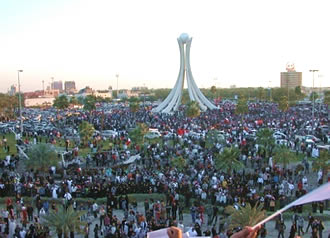If you have not yet been contacted regarding the acceptance or not of your abstract, please let us know via
Once your abstract has been accepted, please register for the conference. Early Bird rates close on 31 August.
If you are submitting a Refereed Paper, please send to
A draft program will be available online as soon as we can manage. Keep checking the website for updates.
 2011 Wisconsin Budget Protests. Source http://en.wikipedia.org/wiki/2011_Wisconsin_protests
2011 Wisconsin Budget Protests. Source http://en.wikipedia.org/wiki/2011_Wisconsin_protestsThe PESA conference prides itself on providing a supportive, encouraging and welcoming environment for the presentation and robust discussion of scholarly work in philosophy of education. Presenters come from many different parts of the world and draw on a wide range of philosophical traditions and perspectives. Postgraduate students and others new to educational philosophy and theory are warmly encouraged to participate.
The theme of the conference is:
Education as Philosophies of Engagement
The term ‘engagement’ has a certain ring to it that immediately identifies with Sartre’s political philosophy understood as accepting the consequences for one’s actions that also extended to the notion of socially responsible writing (littérature engagée). This notion emerged from Marxian, Gramscian, and existential political philosophies that grappled with questions of change and interpretation, experimented with forms of democratic social action and cultivated awareness, authenticity and responsibility as the basis for the education and empowerment of minorities. Increasingly, in the post-war period Western philosophy stretched its boundaries to accommodate the demands of cultural and gender struggles for self-determination against the backdrop of colonisation, patriarchy and North/South inequalities. These philosophies of engagement that were embraced by the likes of Sartre, Beauvoir, Fanon, Freire and many others were grafted and hybridised with forms of democratic participation, grass-roots movement, forms of localism and representation, community empowerment and came to define the notions of civic education and public protest. Various forms of activism drawing on Ghandi and Martin Luther King began to engender the civil disobedience and community-building campaigns that characterised the Black civil rights, peace or anti-war, free speech, women and gay movements that dominated the politics of the 1960s and coloured its counterculture. Active citizenship participation has many philosophical sources and takes many different shapes in the hands of philosophers as diverse as Dewey, Peirce, Gramsci, Freire, Foucault, Derrida, Hall, Sen, Kristeva, Nussbaum, Benhabib, Fraser, Harding and Butler.
 Protesters gathering in Pearl Roundabout in Manama. Source http://en.wikipedia.org/wiki/Arab_Spring
Protesters gathering in Pearl Roundabout in Manama. Source http://en.wikipedia.org/wiki/Arab_SpringOne prevalent and powerful educational model of engagement was “consciousness raising” (including “teach-ins”) popularised by US feminists and adopted thereafter by many political movements, volunteer and community service groups. The free speech movement originating at Berkeley in 1964 based on the demand for the right to political discussion became an important force in the anti-Vietnam campaign. A series of global problems and developments summons the need for a new level of engagement and global responsibility: global warming, child poverty, indigenous rights, the global sex trade, new levels of illicit corporate fraud especially in banking, government corruption, government tyranny, terrorism and the spread of diseases all call out for a critical and practical philosophy that might be called “global philosophies of engagement”. Recent global movements including Occupy, the so-called Arab Spring and demonstrations in Kiev demonstrate social media as convivial and coordinating tools for civic engagement. This conference examines philosophies of engagement in the global context and the potential of social media for new forms of citizen participation.
Possible ideas to pursue
- Pedagogies of engagement
- Engagement as dialogue
- Cultural engagement of the Other
- Cosmopolitanism and global civic engagement
- Human rights education
- Deliberative & participatory democracy
- Global political movements & social network activism
- Freedom of speech and the Internet
- Defending the commons
The aim of this conference is to create a space for dialogue on multiple aspects of philosophy of engagement and how this influences the various discourses of education. Contributors may like to consider engagement as civic responsibility, at a relational level or at the intersections between. This theme also provides avenues for contributors to 'engage' diverse philosophies in new and exciting conversations about education in a changing
Submission deadlines and details
Submissions that are accepted will be presented in 30 minute sessions, that include 10 mins for discussion. If possible we will try to organise 45 minute parallel sessions, but that can not be guaranteed at this stage.
Types of submission:
Submissions may be in the form of a presentation, refereed paper, or a symposium. See the Publications Options section.
Please send a title, type of proposed submission, contributor names and abstract (200 words max) to:
All abstracts will be reviewed by the Conference Committee. The Committee will allocate abstracts to the program taking into account the quality of each abstract, the balance of the program and the relevance of the paper relating to the conference theme.
Submission Formats
- Presentation (of work in progress, non-refeered) - requires an abstract and oral presentation of 25-30 minutes including questions. A presentation will be a work in progress and may use Powerpoint. If you wish to have a summary (2000 word max & a link to a PowerPoint) in the Conference Proceedings, it must be sent by October 24.
- Refereed Paper - requires an abstract and oral presentation of 25-30 minutes including questions. It will appear in the Conference Proceedings and you may choose different publications options. You may choose to revise your paper after the conference for publication in the PESA Conference 2014 Papers (with ISBN number). This is due by January 31 2015.
- Symposium – a set of 3-4 papers or a panel discussion on a specific topic. Each paper requires an abstract and oral presentation of 25-30 minutes including questions). A symposium provides an opportunity to examine specific issues or topics from a variety of perspectives, maybe presenting alternative solutions, interpretations, or contrasting points of view on the topic. A symposium may use a panel discussion format on a specific topic. It may be an interactive session where a large portion of time is devoted to discussion among the presenters and discussants, and/ or questions and discussion among all those present.
ABSTRACTS DUE: by 7th July, 2014 (we would appreciate earlier submissions please)
Abstracts for all submissions must be formatted and submitted according to the abstract template that can be found below.
To download the abstract template please click here (140kb)
To submit your abstract, please use this email address:
Notification: You will be sent an email advising you if your abstract has been accepted or not by Friday 5 August, 2014.
REFEREED PAPERS DUE: by 31 August 2014 (we would appreciate earlier submissions please)
If you are submitting a paper for review and inclusion in the formal conference proceedings (only following acceptance of the abstract and successful review of this manuscript) please follow the author guidelines and other conditions regarding manuscript preparation as set out in the Society’s journal Educational Philosophy and Theory. Further detailed instructions for authors can be found below:
To download the template for papers please click here (151kb) To submit your paper for review (following acceptance of your abstract), please use this email address:
Reviews: You will be sent an email with reviewer comments on your paper by 30th September.
For further information about submissions email:
Please note that a selection of full papers will be considered for inclusion in a special issue of the association's journal Educational Philosophy and Theory focused on the conference theme.
To download a pdf copy of this Call for Papers, please click here 4.6 Mb
